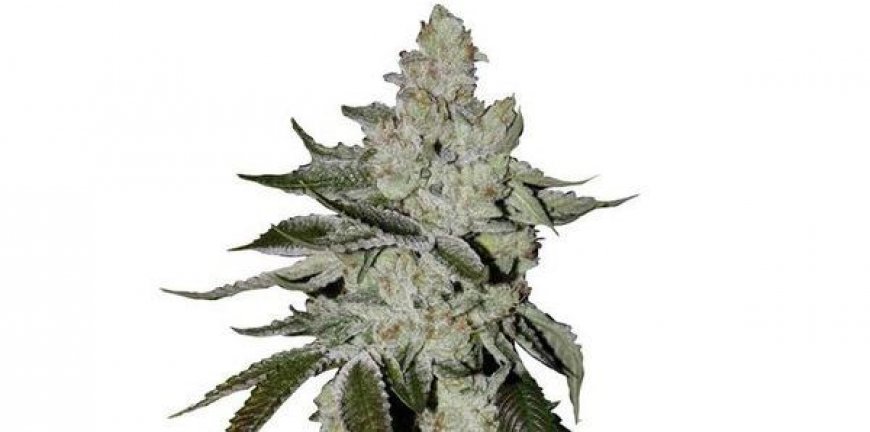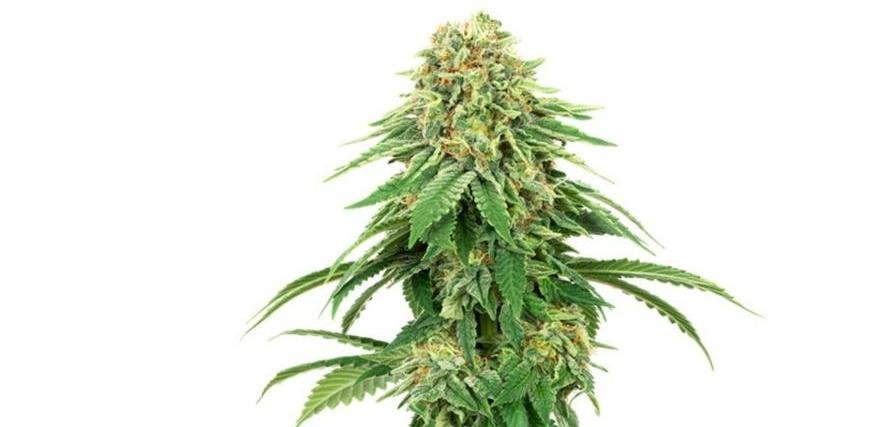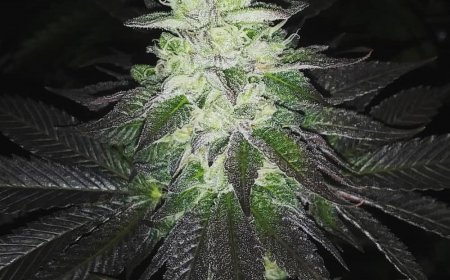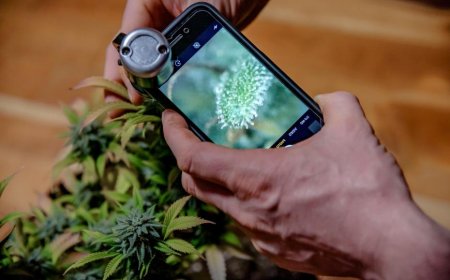Girl Scout Cookies Strain
Experience the euphoric power of GSC with the Girl Scout Cookies strain! Learn how to grow, consume, and benefit from this popular indica-dominant hybrid marijuana strain.

Are you looking for a powerful, euphoric experience? Look no further than the girl scout cookies strain. GSC is an indica-dominant hybrid marijuana strain made by crossing OG Kush with Durban Poison and is known to provide users with waves of full-body relaxation as well as happy and stress-free feelings. If you're ready to take your cannabis consumption up a notch, read on to learn more about this popular strain.
Table of Contents:
- Overview of GSC Strain
- Growing GSC Strain
- Consumption Methods for GSC Strain
- Benefits of GSC Strain
- Side Effects of GSC Strain
- Alternatives to GSC Strain
- FAQs in Relation to Girl Scout Cookies Strain
- Conclusion
Overview of GSC Strain
GSC, formerly known as Girl Scout Cookies, is a hybrid cannabis strain with an impressive THC content of up to 28%. It was first bred in California by crossing OG Kush and Durban Poison. The result is a strain that produces a powerful euphoria and relaxation while also providing mental clarity. GSC has achieved widespread fame thanks to its remarkable blend of effects, ranging from a strong sense of euphoria and relaxation to improved mental clarity.
Origins
The origins of GSC can be traced back to California in 2011 when it was first bred by crossing OG Kush and Durban Poison. This cross resulted in a potent indica-dominant hybrid with an average THC level between 20-28%. GSC has become one of the most sought-after varieties around, rapidly gaining traction throughout America.
THC Content
GSC has a substantial amount of THC, the compound responsible for delivering psychological effects such as elation, comfort, appetite stimulation and improved moods. On average this strain contains 20-28% THC but some samples have been tested at higher levels up to 33%. GSC is among the more powerful varieties currently accessible.
Effects
When consuming GSC, users typically experience strong feelings of happiness along with physical relaxation throughout their body; this combination often results in couch lock or sedation depending on how much is consumed at once. Additionally, many people report feeling mentally alert despite their relaxed state, allowing them to focus better than usual without any cognitive impairment or foggy thinking associated with other indica-dominant hybrids such as Granddaddy Purple or White Widow. In addition to these primary effects, users may also experience increased appetite and improved moods, making it ideal for treating conditions such as stress, depression, anxiety, insomnia, pain fatigue nausea etc.
The GSC strain is a popular and potent cannabis variety, with its origins tracing back to the San Francisco Bay Area. With careful attention to climate requirements, nutrient needs, and harvesting tips, growers can ensure that they are getting the best results when cultivating this unique plant.

Growing GSC Strain
GSC Strain is a much-admired cannabis type, with numerous consumers asserting it to be among the most potent and flavorful varieties available. The Girl Scout Cookies (GSC) strain features earthy aromas and flavors that range from sweet to sour. It has become a go-to strain for both recreational and medicinal marijuana users alike due to its strong effects.
Climate Requirements:
When growing GSC outdoors, the climate should be warm but not too hot. Temps of 70°F to 85°F are ideal for GSC, and it prefers a bright environment with not much moisture. For optimal indoor growth, temperatures should remain consistent with daytime highs of 65°F - 75°F and nighttime lows of 55°F - 65°F.
Nutrient Needs:
To ensure optimal growth of your GSC plants, they will need an adequate supply of nutrients throughout their life cycle. A well balanced fertilizer containing nitrogen, phosphorus and potassium can help provide these essential nutrients needed for healthy plant growth and development. Additionally, adding calcium carbonate or other soil amendments may also be beneficial depending on your soil's pH level requirements which you can test using a soil testing kit or send off samples to get tested by professionals if necessary .
Once you have grown your GSC strain, it is important to understand the different methods of consumption for maximum enjoyment. The next section will cover various smoking/vaping options as well as edibles and tinctures that can be used with this particular strain.
Consumption Methods for GSC Strain
Smoking/Vaping Options:
GSC is a popular strain of cannabis, also known as Girl Scout Cookies. The distinctive aroma and flavor of GSC make it a popular selection among cannabis consumers. This indica-dominant hybrid can be smoked or vaporized in various ways, including joints, blunts, bongs, pipes, and vaporizers. When smoking GSC flower directly from the bud form (joints/blunts), users should expect to experience potent effects quickly after inhalation due to its high THC content (up to 28%). If you’re looking for a smoother hit with less smoke inhaled, try using a pipe or bong instead. Vaporizing GSC flower is another great option because it allows users to enjoy all of the same flavors and effects while avoiding some of the harshness associated with combustion methods like smoking.
Smoking or vaping GSC strain is an effective way to consume it, however there are other methods that can be used as well. In this part, we will look into the advantages of utilizing this unique strain.
Benefits of GSC Strain
GSC's sweet, earthy aroma has made it a highly sought-after strain for its therapeutic effects like stress relief, pain management, and appetite stimulation. GSC offers users stress relief, pain management, and improved appetite—all great benefits for those looking to improve their overall well-being.
GSC strain, also known as Girl Scout Cookies, has become increasingly popular for its earthy aroma with hints of sweetness. This indica-dominant hybrid provides users a plethora of benefits such as stress relief, pain management and increased appetite levels; making it the go-to choice for many individuals seeking symptom relief without resorting to harsh medications or treatments that could cause further harm down the line. THC and CBD found in this particular strain are responsible for relaxing both mind and body while providing an overall calming effect on the user’s mood which can be highly beneficial for those who suffer from anxiety.
Caution should always be exercised when engaging in any form of marijuana consumption, whether smoking/vaping or ingesting edibles/tinctures made from GSC flowers. The side effects associated with using GSC are generally mild but should still be taken into account; dry mouth and eyes being the most commonly reported ones, as well as dizziness and paranoia at higher doses if not kept under control. Keep your wits about you when indulging in this powerful cannabis flower.
Though its legal status varies depending on where you live - recreational use is allowed in some states while medicinal use only exists elsewhere - there is no denying that Girl Scout Cookies Strain is here to stay. This strain of marijuana provides a multitude of advantageous effects, from calming anxiety to stimulating hunger; making it perfect for both novices and more seasoned consumers.
The GSC strain provides many beneficial effects, such as stress relief, pain management and improved appetite. Nevertheless, caution should be exercised when using GSC as its side effects can not be overlooked.
Side Effects of GSC Strain
The Girl Scout Cookies (GSC) strain is a popular cannabis strain that has been around for years. This indica-dominant strain offers an earthy bouquet and a sweet taste, making it beloved by many cannabis users. GSC has several different phenotypes, including Thin Mints and Platinum Cookies. While this potent strain can offer numerous benefits, there are also some potential side effects to consider before using it.
Dry Mouth and Eyes:
One of the most common side effects associated with consuming the GSC strain is dry mouth and eyes. This occurs when cannabinoids bind to receptors in the salivary glands or tear ducts, resulting in decreased production of saliva or tears respectively. To combat this issue, make sure you drink plenty of water while consuming GSC as well as after consumption to help keep your body hydrated. One possible way to alleviate any discomfort due to lack of moisture in the eyes is by using eye drops.
Consuming GSC may result in dizziness and paranoia, due to its high THC content potentially causing psychoactive effects such as confusion or anxiety. To avoid these symptoms, it is best to take regular breaks from using cannabis products and ensure proper dosing information is obtained before recreational use. If any of the aforementioned reactions occur during use, one should immediately cease consumption and seek medical attention if necessary; furthermore, prolonged use at higher doses than recommended may lead to more severe reactions such as panic attacks or psychosis episodes down the line.
Overall, understanding potential risks associated with cannabis consumption is important before trying out new strains like GSC - especially since it contains higher levels of THC compared to other strains available on the market today. Therefore, it is essential to always consult with your doctor first before beginning any kind of regimen involving recreational marijuana usage, whether medicinally prescribed through legal channels such as state/country approved dispensaries and providers/physicians etc.
The side effects of GSC strain should not be taken lightly and can have a serious impact on the user's health.
Alternatives to GSC Strain
Alternatives to GSC Strain are a great option for those looking to experience the same therapeutic benefits of cannabis without the psychoactive effects. For many, GSC is an excellent choice due to its balanced THC content and well-rounded effects. However, there are other strains that can provide similar results with slightly different experiences. Here we’ll explore some of the top alternatives to GSC strain for those seeking relief from pain, stress or anxiety.
First up is White Widow; this hybrid strain is known for its powerful uplifting effect which makes it perfect for treating depression and fatigue while also providing relaxation and euphoria in equal measure. It has a high THC content ranging between 18-25%, so it’s important to go slow when trying this one out.
Next on our list is Blue Dream; this sativa dominant hybrid has become increasingly popular over recent years due to its sweet berry aroma and full body relaxation that comes along with it. The average THC level of Blue Dream ranges between 17-24%.
GDP (Granddaddy Purple) is a great option for those seeking a mellower experience than Blue Dream. This indica-dominant hybrid, created by crossing Purple Urkle and Big Bud, provides users with an incredibly soothing yet stimulating effect that can be beneficial when tackling issues such as insomnia or chronic pain. With its high levels of CBD, GDP offers anti-inflammatory properties while keeping your head clear throughout the day; its average THC content ranges from 15 to 20%.
Finally we have Sour Diesel; another sativa dominant strain famous for its energizing properties which come from its combination of citrusy aromas and high levels of THC (18-25%). Many people use Sour Diesel during times when they need extra focus or motivation such as studying or working long hours at work since it helps keep you alert without feeling overly stimulated like some other strains might do if consumed in large doses.
No matter what type of relief you're seeking, there are plenty of options available outside of just GSC Strain. Each offers unique benefits depending on your individual needs. With so much variety out there, experimenting until you find what works best will be key in finding your perfect match.
FAQs in Relation to Girl Scout Cookies Strain
What is the information on the strain Girl Scout Cookies?
Girl Scout Cookies (GSC) is an incredibly popular strain of cannabis, renowned for its sweet and earthy aroma. It is a hybrid cross between OG Kush and Durban Poison, resulting in a balanced blend of indica and sativa effects. GSC offers users a potent high that begins with an uplifting cerebral buzz followed by deep relaxation throughout the body. The smell can be described as having notes of pine, woodiness, sweetness, lemon-lime citrus tones, mint chocolate chip cookies or even skunkiness at times. This strain has become so popular due to its strong potency combined with delicious flavor profile that it has been awarded several Cannabis Cup awards since 2012.
What does Girl Scout Cookies strain do to you?
It provides users with an uplifting, euphoric feeling that helps to reduce stress while. The effects can last up to three hours and include increased focus, creativity, relaxation, and overall happiness. This weed is most advantageous to use in the evening or at night, as it may make one feel sleepy during daylight hours.
Is Girl Scout Cookies one of the strongest strains?
Yes, Girl Scout Cookies is one of the strongest strains available. It has a THC content ranging from 17-28%, making it more potent than most other cannabis strains. The effects of Girl Scout Cookies are renowned for their potency and longevity, with some consumers claiming a profound cerebral experience that can last up to several hours. Its unique taste has made it sought-after by both recreational users.
What is the history of the Girl Scout Cookies strain?
The Girl Scout Cookies strain is a hybrid cannabis variety that was first cultivated in California. Its potent effects and delectable flavor have made it a favorite among cannabis users. The Girl Scout Cookies strain is known for its powerful THC levels, up to 28%, as well as a distinct sweet and earthy scent. Its popularity has made it an iconic part of modern cannabis culture, with numerous variations now available on the market today.
Conclusion
In conclusion, GSC strain is a popular indica-dominant hybrid marijuana strain that produces euphoric effects followed by waves of full-body relaxation. This strain features a robust THC level and should be reserved for experienced cannabis consumers. There are also many alternatives available if you're looking for something different than GSC. No matter what your preference may be, make sure to always research thoroughly before making any decisions regarding cannabis consumption or cultivation.






































































































































